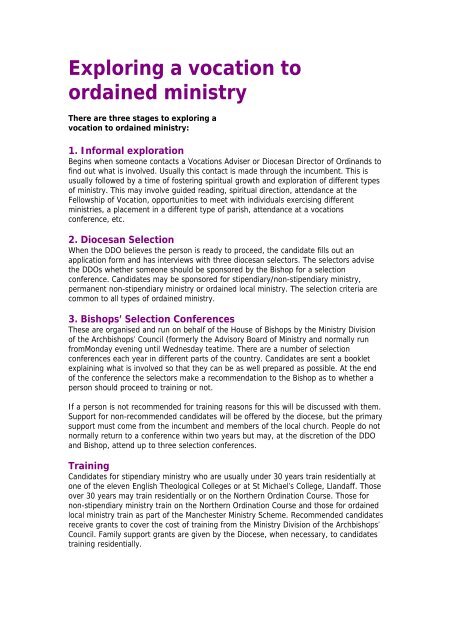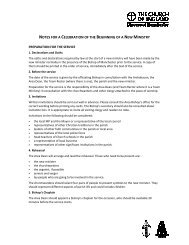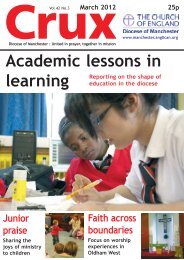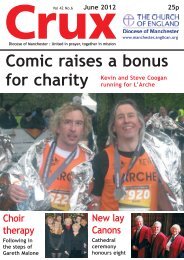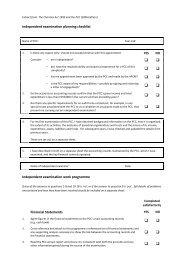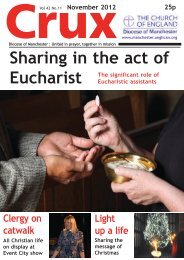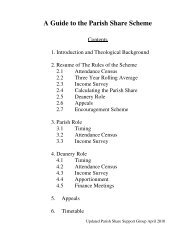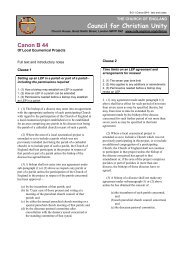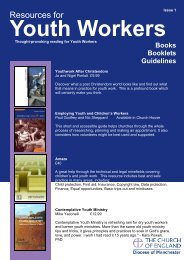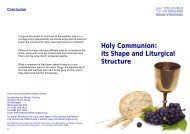Exploring a vocation to ordained ministry - The Diocese of Manchester
Exploring a vocation to ordained ministry - The Diocese of Manchester
Exploring a vocation to ordained ministry - The Diocese of Manchester
Create successful ePaper yourself
Turn your PDF publications into a flip-book with our unique Google optimized e-Paper software.
<strong>Exploring</strong> a <strong>vocation</strong> <strong>to</strong><strong>ordained</strong> <strong>ministry</strong><strong>The</strong>re are three stages <strong>to</strong> exploring a<strong>vocation</strong> <strong>to</strong> <strong>ordained</strong> <strong>ministry</strong>:1. Informal explorationBegins when someone contacts a Vocations Adviser or Diocesan Direc<strong>to</strong>r <strong>of</strong> Ordinands <strong>to</strong>find out what is involved. Usually this contact is made through the incumbent. This isusually followed by a time <strong>of</strong> fostering spiritual growth and exploration <strong>of</strong> different types<strong>of</strong> <strong>ministry</strong>. This may involve guided reading, spiritual direction, attendance at theFellowship <strong>of</strong> Vocation, opportunities <strong>to</strong> meet with individuals exercising differentministries, a placement in a different type <strong>of</strong> parish, attendance at a <strong>vocation</strong>sconference, etc.2. Diocesan SelectionWhen the DDO believes the person is ready <strong>to</strong> proceed, the candidate fills out anapplication form and has interviews with three diocesan selec<strong>to</strong>rs. <strong>The</strong> selec<strong>to</strong>rs advisethe DDOs whether someone should be sponsored by the Bishop for a selectionconference. Candidates may be sponsored for stipendiary/non-stipendiary <strong>ministry</strong>,permanent non-stipendiary <strong>ministry</strong> or <strong>ordained</strong> local <strong>ministry</strong>. <strong>The</strong> selection criteria arecommon <strong>to</strong> all types <strong>of</strong> <strong>ordained</strong> <strong>ministry</strong>.3. Bishops’ Selection Conferences<strong>The</strong>se are organised and run on behalf <strong>of</strong> the House <strong>of</strong> Bishops by the Ministry Division<strong>of</strong> the Archbishops’ Council (formerly the Advisory Board <strong>of</strong> Ministry and normally runfromMonday evening until Wednesday teatime. <strong>The</strong>re are a number <strong>of</strong> selectionconferences each year in different parts <strong>of</strong> the country. Candidates are sent a bookletexplaining what is involved so that they can be as well prepared as possible. At the end<strong>of</strong> the conference the selec<strong>to</strong>rs make a recommendation <strong>to</strong> the Bishop as <strong>to</strong> whether aperson should proceed <strong>to</strong> training or not.If a person is not recommended for training reasons for this will be discussed with them.Support for non-recommended candidates will be <strong>of</strong>fered by the diocese, but the primarysupport must come from the incumbent and members <strong>of</strong> the local church. People do notnormally return <strong>to</strong> a conference within two years but may, at the discretion <strong>of</strong> the DDOand Bishop, attend up <strong>to</strong> three selection conferences.TrainingCandidates for stipendiary <strong>ministry</strong> who are usually under 30 years train residentially a<strong>to</strong>ne <strong>of</strong> the eleven English <strong>The</strong>ological Colleges or at St Michael’s College, Llandaff. Thoseover 30 years may train residentially or on the Northern Ordination Course. Those fornon-stipendiary <strong>ministry</strong> train on the Northern Ordination Course and those for <strong>ordained</strong>local <strong>ministry</strong> train as part <strong>of</strong> the <strong>Manchester</strong> Ministry Scheme. Recommended candidatesreceive grants <strong>to</strong> cover the cost <strong>of</strong> training from the Ministry Division <strong>of</strong> the Archbishops’Council. Family support grants are given by the <strong>Diocese</strong>, when necessary, <strong>to</strong> candidatestraining residentially.
ALSOVocation is a wide area, as it covers the calling <strong>of</strong> all Christians <strong>to</strong> follow God’s particularcalling for their lives, and <strong>to</strong> use their gifts in his service. Much <strong>of</strong> this exploration willtake place at parish level, whether this is <strong>to</strong> do with <strong>vocation</strong>s in the wider world, orparticular avenues <strong>of</strong> service in the church.Further information is available from: www.c<strong>of</strong>e.anglican.org/more_involved/index.html


